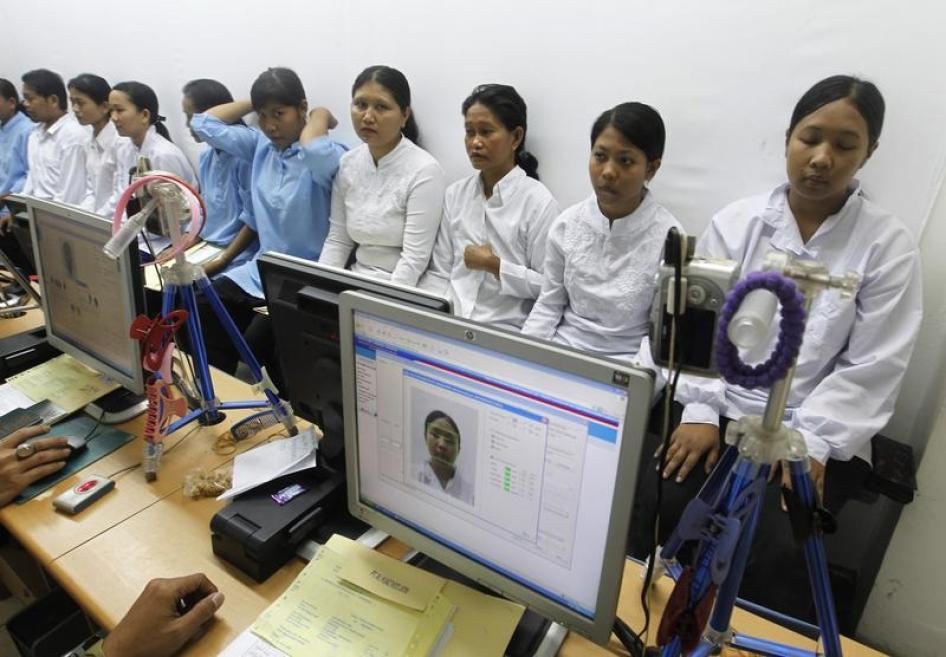Latika C. sat cross-legged on the floor of a cramped room telling her story about how she ended up in Muscat, Oman, as a domestic worker. Back home in Bangladesh, her husband’s paralysis had required an expensive operation that plunged them into debt. Through a recruitment agent, she found out about an opportunity for employment abroad. In October 2014, at the age of 29, Latika boarded a flight for the first time in her life, bound for Abu Dhabi, capital of the United Arab Emirates, for a domestic worker job.
When she arrived, though, a recruitment agency representative took her to the northern town of al-Ain, where an Omani man hired her. Latika, whose name was changed for her safety, said the employer confiscated her passport, took her across the border to Oman, and made her work 15 hours a day with no rest or day off. He did not pay her for the five months she worked and beat her when she asked for her salary. “He cut my hair and burned my feet with hot water,” she says, pointing to the patches of her missing hair and burns on her feet. Shortly after that incident, she fled.
Millions of women, like Latika, migrate as the sole breadwinner for their families to work as domestic workers abroad. With few employment opportunities at home, this is often a choice of last resort. Their wages help to clothe, feed, and educate their children while they care for and raise other children.
While many migrant domestic workers realize their hopes for decent salaries and good working conditions, others face a far bleaker reality. Latika’s case unfortunately is not rare.
Viewed as unpaid “women’s work” for centuries, domestic work remains one of the most undervalued and least regulated forms of employment. Many countries still do not conceive of it as “real” work and often exclude paid domestic workers from protections offered by their labor laws. Consequently, many of the world’s estimated 67.1 million domestic workers, the vast majority of whom are women, are given very few rights or protections.
Migrant domestic workers—around 11.5 million worldwide—are made even more vulnerable to abuse by many countries’ restrictive immigration systems. In the Gulf Cooperation Council (GCC) states—which host over 2 million migrant domestic workers—migrant workers’ visas are tied to their employers so they cannot change jobs without their employer’s consent. Under this “kafala” system, migrant workers who escape an abusive employer can be punished for “absconding” with imprisonment, fines, and deportation. Almost all of the hundreds of migrant domestic workers that have been interviewed by Human Rights Watch in GCC countries over the years claimed that their employers had confiscated their passports as a matter of course, to ensure that they could not escape.
The fact that domestic workers are hidden behind closed doors, living in their employer’s home, compounds the abuses inherent in this system. Employers can easily overwork them, and often do. Some migrant domestic workers recounted to Human Rights Watch how they were forced to work, in extreme cases, up to 21 hours a day with no rest and no day off. Many said their employers did not pay them their full salaries, either paying them less than promised, delaying or withholding their salaries to force them to continue to work in abusive conditions, or denying payment altogether.
Many said their employers confiscated their phones and restricted their communication. Some said their employers gave them little food, scraps left over from family meals, or starved them as punishment for “mistakes” in their work. Women also described sleeping in kitchens, storage rooms, or open living rooms. Many said they were humiliated, insulted, and shouted at on a daily basis. Some said their employers slapped, beat, or burned them. Several spoke of sexual abuse: harassment, assaults, even rape.
In the face of such abusive conditions, some women had risked their lives to escape, climbing down the outside of tall buildings, jumping off balconies, or walking for miles in the desert heat. But those who fled typically found little help or redress. Women described to Human Rights Watch how their employers reported them for “absconding” or filed trumped-up criminal charges against them, such as theft. Often domestic workers dropped any claims against their employers, in exchange for their employers dropping their own accusations, just so the women could go home. Others found the process of appealing for their unpaid salaries or filing criminal complaints prohibitively lengthy and costly, as they are not allowed to work for another employer during an appeal. The end result is that many domestic workers go home unpaid and without redress.
This grim reality is why we need to redouble our efforts in the fight for domestic workers’ rights.
June 16—International Domestic Workers Day—commemorates the fifth anniversary of the adoption of the landmark International Labour Organization (ILO) convention on decent work for domestic workers. The treaty was the first to codify the principle that domestic workers should be accorded equal treatment with other workers and given adequate protections against violence and abuse. Twenty-two countries have ratified the treaty, and many more have adopted labor law reforms improving protections for domestic workers.
Even in the Gulf, some small steps toward reform have been seen. In June 2015, Kuwait passed a law providing domestic workers with labor rights such as a weekly day off, overtime compensation, and annual leave.
While some of the achievements should be celebrated, much more still needs to be done. All countries should ratify the ILO treaty on domestic workers, and reform their labor and immigration laws to ensure that domestic workers have the same rights and protections as other workers. Latika left Bangladesh in search of a better fortune in the Middle East but ended up unpaid, beaten, and burned. Without adequate reforms, many more will share a similar fate.









